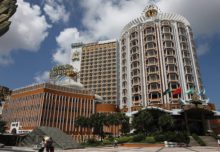It’s one of the heated debates raging in the gaming industry, especially here. Just what is driving the VIP plunge? Is it a structural trend or a temporary one? What role does the anti-graft campaign launched by Beijing authorities play in the diminishing revenues coming from high rollers? Do the new Asian gaming destinations represent real competition for Macau? According to the most recent report on the VIP market, released by Morgan Stanley, two major conclusions assert themselves. First, the high roller segment is shrinking globally and not only in Macau. Second, some VIP gamblers are, in fact, sidestepping Macau to play elsewhere but their numbers are still residual. Macau is not only the world’s gaming mecca, it’s also the world’s biggest VIP market: It generated a remarkable US$30 billion in revenues in 2013 and today still owns more than 60 per cent of the global market. The high roller freefall of last year was spectacular. In March, gaming revenues from the VIP segment dropped more than 50 per cent and in April it’s likely to decrease 40 to 50 per cent, according to the latest forecasts from Wells Fargo and Deutsche Bank. Morgan Stanley estimates that this year alone revenues from high rollers will diminish by 35 per cent. The US bank gives an example of how big the VIP crisis is in Macau, a segment that is still responsible for more than 60 per cent of all money casinos make here. In the good old days, like 2013 and early 2014, the VIP rolling chip volume here was MOP745 billion per month. In February 2015, volumes were running below the MOP300 billion mark. Shrinking ‘While Macau is the largest VIP market in the world, many other markets have identified these drivers and do not face issues currently faced by Macau – anti-corruption campaign, regulatory pressure and slow infrastructure improvement’, Morgan Stanley wrote. ‘Is the overall VIP market shrinking and is some other country gaining market share from Macau? The answer to both questions is yes’, the report said. The first problem is that the VIP gaming market is declining globally. Not because rich individuals are getting poorer – in fact, the number of millionaires and their combined wealth is expanding – but the ones that gamble are spending less on baccarat tables. The anti-money laundering movement across the globe has been particularly strong in China and the US, encouraging high-end customers to adopt a lower profile, Morgan Stanley notes. Junkets are also getting more conservative in extending credit, while casinos have stopped doing so unless they are assured the customer has assets outside of China and Singapore, where junkets are not allowed. If the Macau VIP market shrinks 35 per cent this year, the global VIP market is not in much better shape, posting a drop of 20 per cent, the report said. But it’s not only gamblers that are avoiding Macau. Junkets, the providers of credit to high rollers, are also moving away from Macau to avoid both scrutiny and to search for higher commission rates in other destinations with improving gaming facilities. Morgan Stanley says that Suncity, the largest junket operator here, has already reassigned hundreds of staff to Manila, in the Philippines, while other Macau junkets are operating in Australia and Cambodia. Down under The US bank stresses that Macau casinos are losing high-end customers to gaming facilities in Korea, the Philippines and Australia, the most developed gaming markets in Asia Pacific. The impact in overall figures, however, is quite residual. ‘It appears as if Macau and Singapore lost these customers to Korea, the Philippines and Australia in terms of percentages but in terms of dollar amounts the gains by these regional markets have been less than 10 per cent of losses by Macau and Singapore in 2H14’. The bank noted that VIP revenues in the second half of 2014 in Australia grew an average of 80 per cent: Echo saw high roller revenues double, with SkyCity and Melco also increasing 84 per cent and 61 per cent, respectively. These are the three biggest gaming operators in the country. In Korea, VIP revenues went up 20 to 30 per cent in the same period. Despite the impressive growth rates, the fact is that when compared to Macau the overall figures are just a drop in the ocean. The Macau VIP market is 15 times larger than Australia’s, 20 times Korea’s, and ten times larger than Singapore. For a market still so dependent upon VIP gamblers, the cautious attitude among these customers means tons of money cascading away from casinos here. Accordingly, VIP woes are likely to last. ‘We think the measures and tone set by the government have already caused many VIP patrons to stay below the radar. Even if the intensity slows, we do not expect the impact to go away in the short to medium term’. Morgan Stanley says that according to Suncity, an upper-end VIP client in Macau used to spend between HK$10million to HK$20 million. In the last six months, this amount dropped to a ‘couple of million’. Sing Hou Entertainment, who manages VIP rooms at Galaxy, reported an average spend of HK$1.4 million per player between 2011 and 2014 and around 6 to 8 visits annually.




